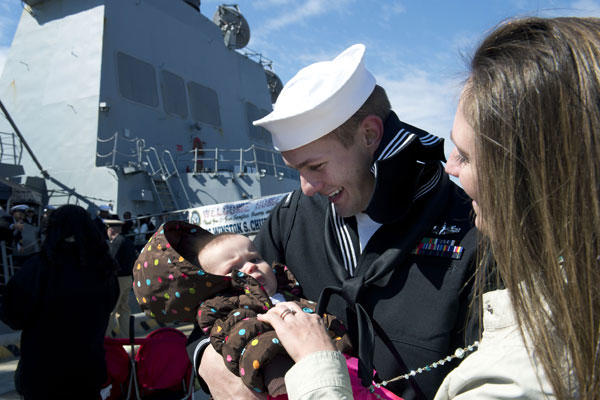Navy families are finding themselves waiting longer than usual for orders to their next duty station due to constraints on the service's manpower budget.
According to information provided to Military.com from Navy Personnel Command, some sailors are receiving orders one month ahead of arrival at their next duty station, instead of the typical three.
"Due to budgetary pressures and a perennially decreased top line for Navy's Manpower Account, we knew PCS funds would be tight toward the end of the fiscal year," Personnel Command spokesman Lt. Cmdr. Nathan Christensen said in a statement. "Consequently, the Navy began to carefully manage the issuance of PCS orders earlier this year, which resulted in shorter lead times for PCS moves."
It's not clear how many sailors are affected by these tighter timelines. Christensen said the Navy was prioritizing PCS moves to stay under budget, giving the highest priority to sailors moving to fill "critical gaps" at sea, individual augmentees, overseas billets, and moves for force protection, humanitarian and safety reasons.
A Defense Department official who requested anonymity to speak freely told Military.com the budget crunch was tied to a continuing resolution that the Navy and other military services had operated under until last December. The CR limited how the Navy could allocate its funds and set the conditions for the current problem.
To date, the Navy has completed planning for these top-priority moves with estimated detach dates through the end of July, Christensen said, and is now working on orders in August and further out. While the end of the fiscal year in September will mean a new defense budget and a replenished manpower account, it's not clear how long the Navy will continue issuing PCS orders with minimal lead time.
"That's something we're going to have a take a look at," Christensen said. "We just don't have an answer to that question."
For Navy families caught in limbo between orders, the wait can be nerve-wracking and expensive.
One military spouse whose husband was a Navy officer stationed at Camp Pendleton told Military.com her family is waiting for orders to the Netherlands so he can begin an exchange tour with the Dutch Navy.
The family remains on the West Coast, with most of their belongings in storage in anticipation of a move they're expecting to make in August. Because they still don't have orders, the woman said, her husband hasn't been able to find a place for the family to live overseas. She estimates that they will have lost between $2,000 and $4,000 in out-of-pocket costs, including lost income from a job she had to quit, because of the uncertainty.
"With this situation, I've had to leave work months early," she said. "If I knew what the timing was, I would have committed longer."
Another Navy spouse, Nicole Paynter, says her family is waiting on orders from Navy Operations Support Command in Springfield, Oregon, where her husband is a unit commanding officer, to Navy Personnel Command in Millington, Tennessee. Paynter said her husband was originally supposed to start at his new post in mid-June, but now they are told the move will happen in the middle of September, with orders coming in mid-August.
The timeline was too tight to schedule military movers, so the family will be moving on their own for the first time in 18 years in the Navy. Paynter said her oldest son continued to attend high school, staying with her parents, when the family moved out to Oregon, and not having a certain return date is an additional stressor.
"The unknowing is the worst part," she said.
Christensen said he encouraged Navy families to stay in touch with detailers and added that letters of intent will be issued for overseas moves to help dependents accomplish some tasks, such as medical screenings, security clearances, and passport applications.
The Navy is also putting together a working group of officers and enlisted leaders from around the fleet, he said, to examine ways to minimize additional impacts to sailors as the Navy "carefully navigate[s]" PCS orders until the end of the fiscal year. The goal of the working group, he said, is to allow sailors to make planned moves without further reducing lead times for orders.
"We understand that it's hard on sailors and their families," Christensen said.
-- Hope Hodge Seck can be reached at hope.seck@military.com. Follow her on Twitter at@HopeSeck.





























